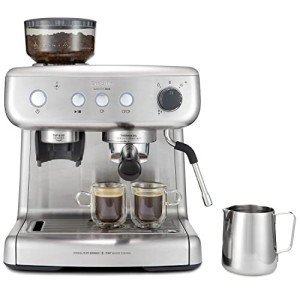The Most Significant Issue With High-Quality Espresso Machines, And How You Can Fix It
The World of High-Quality Espresso Machines: A Comprehensive Guide
Espresso has actually become a beloved drink among coffee enthusiasts worldwide, known for its abundant flavor, intense aroma, and versatility. The heart of a terrific espresso depends on the machine used to brew it. High-quality espresso machines are created to deliver the best shot, making them an essential financial investment for coffee fans. This post explores various kinds of high-quality espresso machines, their features, upkeep tips, and answers to regularly asked concerns.
Kinds Of High-Quality Espresso Machines
High-quality espresso machines fall into a number of categories, dealing with various preferences, ability levels, and budgets. The primary types consist of:
Type of Machine
Description
Ideal User
Manual Espresso Machines
Needs user skill to manage extraction and pressure. Offers the most control over the brewing process.
Experienced baristas and enthusiasts
Semi-Automatic Machines
Combines manual operation with automation. Users control the grind and tamping, while the machine handles water dispersion.
Intermediate users
Automatic Espresso Machines
Automate the developing procedure, allowing for programmable developing times and temperature levels.
Casual coffee drinkers
Super-Automatic Machines
Have integrated mills and are totally automated, handling whatever from grinding to developing and steaming.
Users seeking convenience
Commercial Espresso Machines
Created for high volume use in cafes and dining establishments, using toughness and speed.
Company owner
In-depth Overview of Each Type
Manual Espresso Machines
- Pros: Complete control over the developing process; can produce remarkable quality espresso.
- Cons: Requires substantial skill; time-consuming.
Semi-Automatic Machines
- Pros: Balanced control, blending manual and automatic procedures; superior quality espresso is still possible.
- Cons: Requires some understanding and experience to master.
Automatic Espresso Machines
- Pros: User-friendly; reduces the finding out curve while still producing high-quality espresso.
- Cons: Still requires some understanding of coffee-making basics.
Super-Automatic Machines
- Pros: Maximal benefit; little ability needed; suitable for people or families who want coffee without difficulty.
- Cons: Higher cost point; may do not have the fine-tuning abilities of manual machines.
Commercial Espresso Machines
- Pros: Built for durability and performance; typically consists of features for high-volume turns.
- Cons: Expensive; might be overkill for home use.
Secret Features to Consider
When trying to find a high-quality espresso machine, several crucial functions need to be taken into consideration:
- Pressure and Pump Type: Look for machines with a minimum of 9 bars of pressure, which is important for drawing out the very best taste from coffee beans.
- Boiler Type: Single, double, and heat exchanger boilers each impact how the machine carries out and the speed of developing.
- Build Quality: High-quality products such as stainless-steel are more effective for sturdiness and aesthetic appeals.
- Reduce of Use and Cleaning: Some machines need comprehensive cleansing, while others are developed for simple maintenance.
- Temperature level Control: Consistent temperature is vital; think about machines with PID controllers for accurate control.
Advantages of High-Quality Espresso Machines
Buying a high-quality espresso machine provides a plethora of advantages:
- Superior Quality: High-end machines permit greater control, resulting in tastier espresso.
- Resilience: Built to last, quality machines require fewer repair work and replacements.
- Customization: Users can take pleasure in a customized experience by adjusting grind size, shot timing, and other settings.
- Increased Convenience: Automatic and super-automatic options enable enthusiasts to take pleasure in espresso with very little effort.
Upkeep and Care for High-Quality Espresso Machines
To keep an espresso machine working optimally, regular upkeep is vital. Here are tips for keeping a high-quality espresso machine:
Descale Regularly:
- Use a descaling solution every few months to avoid buildup of minerals from water, which can impact flavor and performance.
Tidy the Brew Group:
- For machines with a detachable brew group, clean it routinely to ensure a clean extraction.
Replace Water Filters:
- Use a water filter and alter it as needed to decrease pollutants in your developing water.
Daily Cleanings:
- Rinse the portafilter and group head after each use to prevent oil buildup.
Keep an Eye on the Parts:
- Monitor seals, gaskets, and other parts for wear and tear and replace them as required.
Regularly Asked Questions (FAQs)
1. What is the very best espresso machine for newbies?
For newbies, a semi-automatic machine typically supplies a great balance of use and control, permitting users to discover the skills required for making terrific espresso.
2. Are super-automatic machines worth the financial investment?
Yes, for those who prioritize benefit and ease over control, super-automatic machines can be a worthy investment, specifically for families or busy professionals.
3. Just how much should I expect to spend on a high-quality espresso machine?
High-quality espresso machines range significantly in price, with manual machines beginning at a couple of hundred dollars, while super-automatic or commercial machines can go beyond numerous thousand.
4. Can I make other coffee beverages with an espresso machine?
Yes, numerous espresso machines have steam wands or accessories that permit users to create lattes, coffees, and more.
5. The length of time do espresso machines usually last?
With proper upkeep, high-quality espresso machines can last over a years, making them a long-lasting financial investment in your coffee pleasure.
High-quality espresso machines yield a transformative coffee experience, whether taken pleasure in at home or in a commercial setting. By understanding Espresso Machines With Milk Frother , their functions, and the maintenance needed to keep them running efficiently, consumers can make informed decisions that raise their coffee-drinking experience.
